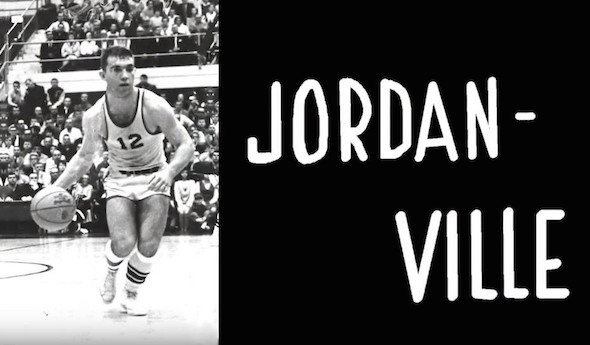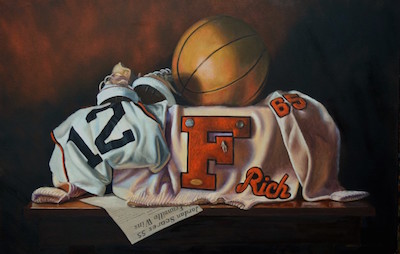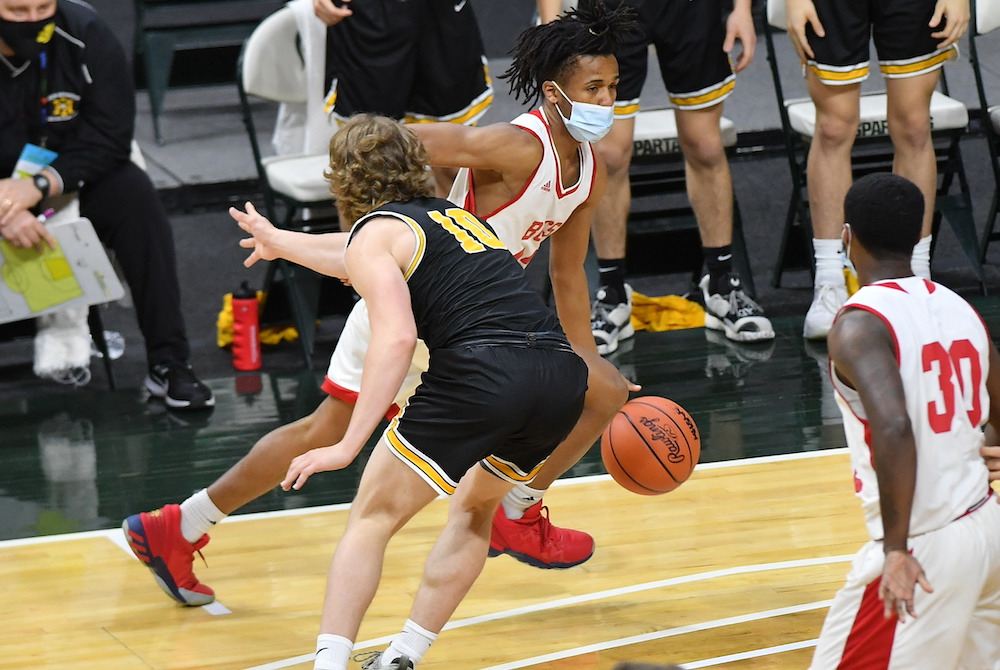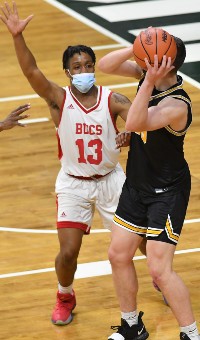
Film Fills In Picture of 'Fennville Flash'
By
Ron Pesch
MHSAA historian
December 28, 2017
We’ve been here before, but not in this way.
The last time was for a retrospective, covering one of the most impressive and awe-inspiring prep careers in Michigan high school history. That time was in print, and included a handful of still images that tried to illustrate the unbelievable.
But this time, the story is in documentary form. It’s woven together from grainy, scratched, faded silent film, a format of capturing memories familiar to thousands of people from generations past, as well as a series of modern-day high-resolution interviews.
Here, the basketball life of the athlete known as the “Fennville Flash” delivers on many levels. Yes, there is a Richie Jordan.
JordanVille, a documentary by John Mooy & Anne Colton, recalls a time when legend spread via word of mouth, newsprint and AM radio.
While it’s hard to comprehend for many today, the exploits of our athletic heroes were formed by “poets in the press box” who sat with pencil and paper, a typewriter, a microphone or a telephone, and described to their audience what they witnessed. On the receiving end, readers and listeners conjured up visualizations based on the facts, phrases and superlatives designed to create an image.
“Traveling left to right on your radio dial” helped listeners feel they were a member of the crowd, seated in the stands, in on the action and a witness to the mayhem. “Packed to the rafters,” reminded fans the importance of what was happening. An exciting game, presented by those with skill, created an event you longed to see. If a broadcast couldn’t be picked up on a transistor or tube radio, the final result might not be known, at the earliest, until the following day’s newspaper arrived.
I’ve told Jordan’s story via the MHSAA before; how he latched on to athletic training, weights and repetition to mold himself into a well-rounded athlete, able to leap to heights unexpected for a kid with a 5-foot-7 frame. The tales of his unfathomable accomplishments slowly leaked beyond the city limits of Fennville into Kalamazoo and greater Southwestern Michigan, then to Detroit. When Detroit Free Press writer Hal Schram relayed Jordan’s feats, the secret traveled across the state and beyond its drawn borders.
From there the legend of Jordan’s accomplishments grew. In Fennville, as in many small towns across the country, the city shut down when a game was played. The Jordan story was so enticing that thousands would travel vast distances to see him play with their own eyes. Today, his single season scoring average of 44.4 points per game during the 1964-65 campaign still remains the top mark in the MHSAA record book.
 JordanVille runs just shy of a half hour. Contained within is insight into the athlete that is challenging to relay in print form. Thanks to access to home movies and a series of interviews with Jordan, former teammates, past opponents and his high school coach, the determination, dedication and drive of a kid who wouldn’t let physical size be a deterrent from achievement radiates from the screen. On display is small town America at its finest, and perspective formed over 50+ years.
JordanVille runs just shy of a half hour. Contained within is insight into the athlete that is challenging to relay in print form. Thanks to access to home movies and a series of interviews with Jordan, former teammates, past opponents and his high school coach, the determination, dedication and drive of a kid who wouldn’t let physical size be a deterrent from achievement radiates from the screen. On display is small town America at its finest, and perspective formed over 50+ years.
For Mooy, it completes a filmmaking journey started six years ago. But the story of Jordan, in his eyes, date back to his school days. Mooy first heard about Jordan as a 7th-grader from a math teacher. A second-team all-St. Joseph Valley League selection, Mooy played at Marcellus High School and scrimmaged against Jordan and the Fennville Blackhawks.
He couldn’t believe his eyes.
“Everyone wanted to see this kid play,” said Mooy in 2011. “He was the first high school player I saw sign an autograph.
Today, with the interviews complete, and the film ready for viewing, Mooy sees more than just a sports story:
“With the benefit of years now passed, I look at the Rich Jordan story with a new respect. JordanVille created a place that was welcoming no matter who you were, or what color your skin happened to be. It was the 1960s. Rich was growing up Jewish, the Civil Rights Movement was in full swing, and the Vietnam War was on everyone's mind. And in Fennville, Michigan, from 1961 to 1965, the Jordan high school years, there were lessons beyond sports being learned by everyone that would last a lifetime. The Jordan household, under the guidance of (his parents) Tuffy and Sylvia Jordan, is where the story begins."
The film speaks of a time that has departed. Competition for our attention was less focused; phones hung on walls or sat on tabletops, communities were tighter, the training table featured peanut butter and chocolate milk instead of protein powder. A city could easily be renamed for a day.
The film also reminds us that those days were far from perfect.
If all goes as planned, the public will see the finished product come the flip of the calendar. In West Michigan, JordanVille is scheduled to show on New Year’s Day at 6 p.m. on WGVU, and will repeat on WGVU-Life at 7:30 p.m., Friday, Jan. 5.
Seek it out, and spread the word, just like in days of old.
 Ron Pesch has taken an active role in researching the history of MHSAA events since 1985 and began writing for MHSAA Finals programs in 1986, adding additional features and "flashbacks" in 1992. He inherited the title of MHSAA historian from the late Dick Kishpaugh following the 1993-94 school year, and resides in Muskegon. Contact him at [email protected] with ideas for historical articles.
Ron Pesch has taken an active role in researching the history of MHSAA events since 1985 and began writing for MHSAA Finals programs in 1986, adding additional features and "flashbacks" in 1992. He inherited the title of MHSAA historian from the late Dick Kishpaugh following the 1993-94 school year, and resides in Muskegon. Contact him at [email protected] with ideas for historical articles.
PHOTOS: (Top) Richie Jordan runs Fennville's offense during his thrilling high school career in the 1960s. (Middle) Jordan memorabilia, as captured by Bill Williams.

Beecher Finishes Emotion-Filled Run with Title #9
By
Dean Holzwarth
Special for MHSAA.com
April 10, 2021
EAST LANSING – Eight wasn’t enough for the Flint Beecher boys basketball team.
The Bucs won the program’s ninth MHSAA Finals championship Saturday with an impressive 75-47 victory over Iron Mountain in the Division 3 Final at the Breslin Center.
Beecher moved into a tie for second with Detroit Country Day and Muskegon Christian/Western Michigan Christian for all-time boys basketball championships won. River Rouge tops all schools with 14.
“We just wanted to come out and establish our defense,” Bucs coach Mike Williams said. “They prepared and fought, and they executed. I couldn’t be more proud.”
Beecher had last won a Finals title in 2017. The Bucs’ only loss this winter was to Division 1 contender Orchard Lake St. Mary’s in the second game of the season.
This was an emotional title run for Williams, whose father passed away nearly a year ago to the championship game date from COVID-19.
Senior Keyon Menifield Jr. lost his grandfather the day after due to COVID-19 complications.
“It’s extremely special and these kids have been my therapy,” Williams said. “This has been a long year for me and my family, and we had some other kids deal with it as well. This is a part of the healing for me and the community and the people that have gone through this pandemic. I’m just glad we got to the finish line.”
Menifield Jr. scored a game-high 37 points – the ninth-most in an MHSAA Final. He was 17 of 27 from the field with only one 3-pointer and two free throws contributing to his total.
“We locked down our defense and we knew we had to get stops, close out and get rebounds,” Menifield Jr. said. “I had to attack, and I had to make sure I got in the lane and made shots. The team that makes the most shots wins the battle.”

Williams, whose team won its last 15 games with only two opponents coming within single digits, said Menifield Jr. hasn’t received the attention he deserves.
“I’ve been saying all along that he is either the most underrated player or the best player in the state of Michigan, period,” he said. “I don’t know anyone who wants to guard him, and I’ve talked to college coaches who have not recruited him and told them they were crazy.”
The Bucs also were able to contain Iron Mountain senior standout Foster Wonders, who scored more than 2,000 career points.
He was held to 13 points and didn’t score until the third quarter.
“The best compliment I can give a player is I would pay money to watch him play,” Williams said. “That kid can play, and we knew that we had to neutralize him one way or the other for us to have a chance to win.”
The Bucs held a commanding 38-19 at halftime. They led by as many as 34 in the second half en route to the decisive victory.
The Mountaineers simply couldn't match Flint Beecher’s size, speed and athleticism. The Bucs’ full-court pressure forced 20 turnovers
“All the credit goes to Flint Beecher,” Iron Mountain coach Harvey Johnson said. “They were tough, and they did to us what no other team could do completely. They’re quick, they’re fast and their press and ability to create off the dribble bothered us. He had his team well-prepared.”
Iron Mountain finished as Division 3 runner-up for the second time in three seasons, and Saturday’s loss was only the Mountaineers’ second over the last two seasons. They were 21-1 last year before the pandemic halted the postseason.
“These eight guys were outstanding, and we beat some great teams to get here,” Johnson said. “I think they represented themselves, our school, our community, and the entire Upper Peninsula with great class. They worked hard and overcame a ton of adversity like every other athlete in the state did to get here. Not many kids get to play here, and we were blessed to be able to do that.”
Jurgen Kleiman added 12 points and eight rebounds for Iron Mountain, while Dante Basanese chipped in 11 points.
PHOTOS: (Top) Beecher's Carmelo Harris makes his move toward the lane during Saturday's Division 3 Final. (Middle) The Bucs' Taylin Muldrew (13) gets a hand up as Iron Mountain's Foster Wonders looks to pass. (Click for more from Hockey Weekly Action Photos.)

